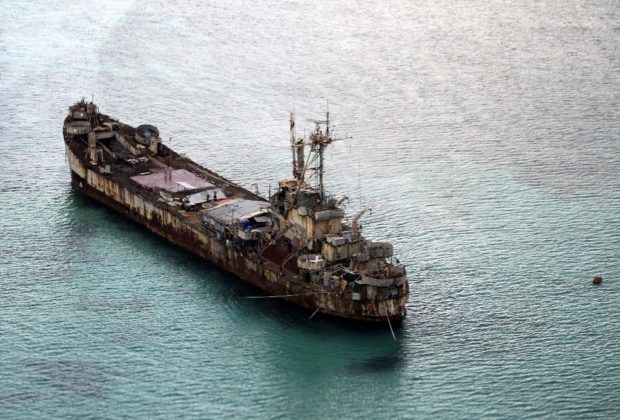
This aerial photograph taken from a military aircraft shows the dilapidated Sierra Madre ship of the Philippine Navy anchored near Ayungin Shoal (Second Thomas Shoal) with Philippine soldiers on board to secure the perimeter in the Spratly group of islands in the South China Sea, west of Palawan, on May 11, 2015. (File photo by RITCHIE B. TONGO / Pool via Agence France-Presse)
PUERTO PRINCESA CITY, Palawan, Philippines — The Philippines successfully delivered fresh supplies to its troops stationed at Ayungin (Second Thomas) Shoal in the West Philippine Sea (WPS) on Tuesday, nearly three weeks after China Coast Guard (CCG) ships thwarted an earlier rotation and resupply mission with water cannons.
The supply boats Unaizah May 1 and 2, escorted by the Philippine Coast Guard’s BRP Cabra (MRRV 4409) and BRP Sindangan (MRRV 4407), completed their task despite new attempts by CCG and militia vessels “to block, harass and interfere,” the National Task Force for the West Philippine Sea (NTF-WPS) said, without elaborating on the Chinese actions.
Philippine Navy vessels had been placed on standby during the whole operation, the task force said in a statement.
National Security Adviser Eduardo Año, head of the NTF-WPS, commended the “unfailing valor, determination, and professionalism” displayed by the Filipino military and coast guard personnel.
Debt of gratitude
“The Filipino people owe them a debt of gratitude, for their commitment to place their lives on the line daily to defend our sovereignty, sovereign rights, jurisdiction throughout the expanse of the WPS,” the NTF-WPS said.
On Aug. 5, one of two supply boats used by the Navy was forced to turn back after CCG vessels fired water cannons at it, preventing it from bringing food and other provisions to the soldiers manning the BRP Sierra Madre, a grounded warship serving as a Philippine military outpost in Ayungin.
Philippine officials had described the incident as a “David versus Goliath” situation, as it was the first time in recent memory that such a large number of Chinese vessels obstructed a Philippine resupply mission to Ayungin, with six CCG vessels, two Chinese militia ships and three People’s Liberation Army Navy ships observed in the area.
On the other hand, the Philippine side only had two PCG ships and two small boats at the time.
The incident prompted Manila to file a diplomatic protest against Beijing, and the Department of Foreign Affairs summoned Chinese Ambassador Huang Xilian to ask him to explain the CCG’s actions.
It also triggered controversy as Beijing repeatedly stated that Manila had promised to remove the BRP Sierra Madre from Ayungin, a claim denied by Philippine officials from the current and former administrations.
In its statement, the NTF-WPS asserted that routine missions to Philippine outposts in various features within the West Philippine Sea would continue “on a regular basis.”
“These missions are part of the Philippine government’s legitimate exercise of its administrative functions over the WPS, in line with the United Nations Convention on the Law of the Sea and the 2016 Arbitral Award, and domestic laws,” it said.
In 2016, an arbitration tribunal in The Hague, Netherlands, upheld the Philippines’ sovereign rights to fish and explore resources in waters within its 370-kilometer exclusive economic zone and invalidated China’s sweeping claims on almost the entire South China Sea.
China has refused to acknowledge that ruling.
In a statement on Tuesday, Sen. Imee Marcos, chair of the Senate Committee on Foreign Relations, urged the government to settle any conflict with Beijing “in a peaceful way.”
“China sent us a note to dialogue; let us talk to them,” she said.
Joint naval drills
For her part, Sen. Risa Hontiveros welcomed reports that the United States, Japan, and Australia were planning joint naval drills in waters off western Philippines, saying the exercises could deter China’s hostile acts.
“Any joint patrol should only serve as reinforcement to the diplomatic means of de-escalating tensions and restoring true peace in the entire South China Sea,” Hontiveros said.
But the Armed Forces of the Philippines on Monday said it was not aware of such drills, denying a report that it had refused to take part in the joint exercises with its allies.